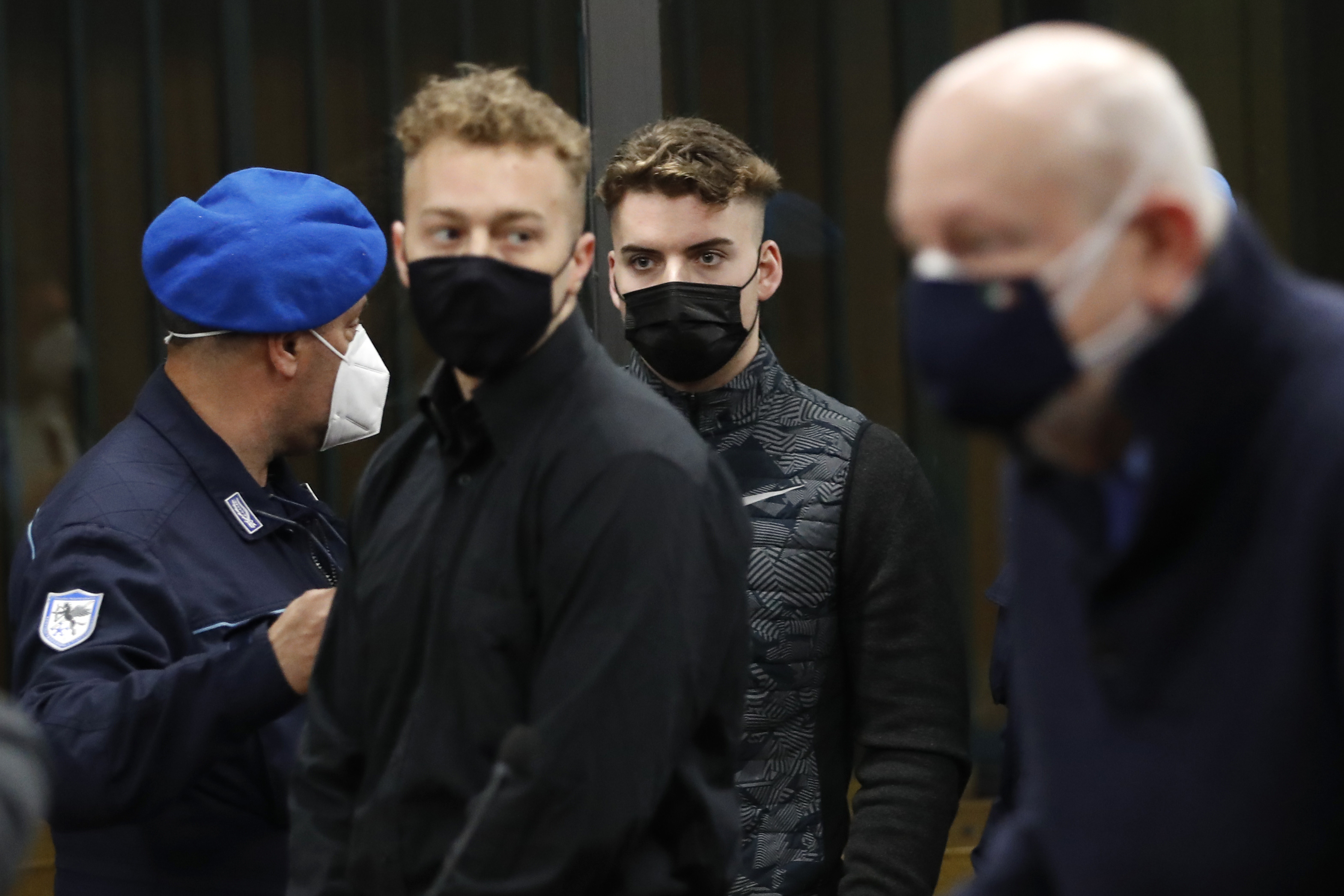
An Italian appeals court on Thursday reduced the sentences of two young Bay Area men serving life terms over the multiple stabbing death of a Carabinieri police officer while they were on vacation in Rome in 2019.
After just over three hours of deliberations, the court in the Italian capital handed down sentences of 24 years to Finnegan Lee Elder and 22 years to Gabriel Natale-Hjorth. It upheld the convictions of the two men for the murder of Carabinieri Vice Brigadier Mario Cerciello Rega on a street near their hotel.
After the first trial last year, the two friends had begun serving the earlier, life sentences, Italy’s harshest punishment, in separate Rome prisons.
Judge Andrea Calabria kept media out of the courtroom for pandemic concerns, and it wasn’t clear how the defendants reacted to the decision. Italy has two levels of appeals, and Elder’s lawyers indicated they would seek recourse.
Cerciello Rega, 35, was given a hero’s funeral in the Naples area’ church where he had been married just a few weeks earlier. The officer was stabbed 11 times, including in vital organs.
His widow, Rosa Maria Esilio, told reporters after Thursday’s verdicts that Cerciello Rega’s blood as a servant of the state will symbolically “remain eternally on the street.” Flanked by her lawyer, she praised the “honor and courage” of a man “who died in the happiest moment of his life.”
In May 2021, the lower court had convicted Elder, now 22, and Natale-Hjorth, now 21, of the slaying as well as of attempted extortion in connection with a botched attempt to buy cocaine in a Rome nightlife district. The two were also convicted of resisting a public official and carrying an attack-style knife without just cause.
Elder addressed the court just before deliberations began.
“At 22 years of age and with three years in prison, I had much time to reflect,” Elder said, speaking in heavily accented, recently acquired Italian. He expressed “remorse for the pain I caused” and for the “endless mourning” suffered by Cerciello Rega’s family.
Get a weekly recap of the latest San Francisco Bay Area housing news. >Sign up for NBC Bay Area’s Housing Deconstructed newsletter.
The officer and his patrol partner, dressed in shorts and casual shirts, were on plainclothes mission when they confronted Elder and Natale-Hjorth in the pre-dawn hours of July 26, 2019. For reasons never fully clear, neither officer brought his service gun on the mission.
Both Elder and Natale-Hjorth testified in their first trial that they thought the officers were thugs out to retaliate after the thwarted deal to buy cocaine hours earlier in another part of Rome.
The surviving patrol partner, Officer Andrea Varriale, insisted the police did identify themselves as Carabinieri, but the defendants disputed that. In the appeals trial, the defense hammered away at contradictions in Varriale’s versions of events.
Elder’s lawyers said in a written statement that while eliminating the earlier life sentence “removed one of the iniquitous aspects” of the lower court’s decision, they questioned why the court apparently “insisted on believing at all costs” the “many lies” of Varriale.
Elder has insisted he stabbed Cerciello Rega in self-defense because he feared the heavyset officer was trying to strangle him.
Prosecutor Vincenzo Saveriano had asked the court to confirm Elder’s life sentence and reduce Natale-Hjorth’s to 24 years.
“Elder doesn’t deserve forgiveness,” Saveriano said in his final argument Thursday. As for the co-defendant, Saveriano noted that Natale-Hjorth’s fingerprints were found by police on a panel of a false ceiling in the American’s hotel room where he hid the knife.
Natale-Hjorth testified at the first trial that he grappled with Cerciello Rega’s partner. He insisted that he was unaware of the stabbing but that he later hid the knife.
Francesco Petrelli, one of his defense lawyers, expressed regret that Natale-Hjorth was convicted, even though he “did not see (the stabbing) happening. He did not plan it and it couldn’t have been predicted.”
Prosecutors alleged Natale-Hjorth devised a scheme to get back 80 euros ($88) the Americans paid for the cocaine they didn’t receive. Angered by the swindle, the tourists snatched the knapsack of the deal’s alleged go-between and demanded their money back in exchange for returning the bag, with the go-between’s cell phone inside, the prosecution alleged.


